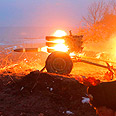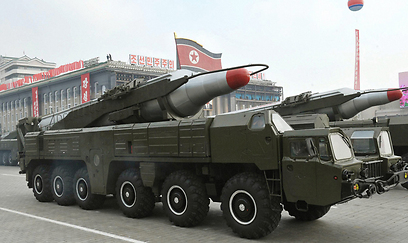
North Korea fires three short-range missiles
N Korea reignites peninsula tensions with launch of 3 short-ranged missiles. South 'beefs up' monitoring of North amid fears of additional provocations
According to the report, the ministry said it detected two launches fired during the morning hours, followed by another launch in the afternoon. In response the south said it had beefed up its monitoring on the northern Korea and is maintaining a high-level of readiness to deal with any "risky" developments.
Related stories:
- Pentagon: North Korea could reach US with nuclear arms
- North Korea replaces hard-line defense chief
- North Korea sentences American to 15 years' labor
Launches by the North of short-term missiles are not uncommon, but the ministry would not speculate whether these latest launches were part of a test or training exercise.
"North Korea fired short-range guided missiles twice in the morning and once in the afternoon off its east coast," an official at the South Korean Defence Ministry spokesman's office said by telephone.
The official said he would not speculate on whether the missiles were fired as part of a drill or training exercise.
"In case of any provocation, the ministry will keep monitoring the situation and remain on alert," he said.

North Korean missiles (Photo: EPA)
A Japanese government source, quoted by Kyodo news agency, noted the three launches, but said none of the missiles landed in Japan's territorial waters.
Tension on the Korean peninsula has subsided in the past month after running high for several weeks following the imposition of tougher UN sanctions against Pyongyang following its third nuclear test in February.
The North had for weeks issued nearly daily warnings of impending nuclear war with the South and the United States.
North Korea conducts regular launches of its Scud short-range missiles, which can hit targets in South Korea.
It conducted a successful launch of a long-range missile last December, saying it put a weather satellite into orbit. The United States and its allies denounced the launch as a test of technology that could one day deliver a nuclear warhead.
During the weeks of high tension, South Korea reported that the North had moved missile launchers into place on its east coast for a possible launch of a medium-range Musudan missile. The Musudan has a range of 3,500 km, putting Japan in range and possibly the US South Pacific island of Guam.
Analysts say the North Korean threats were partly an attempt to push Washington to agree to disarmament-for-aid talks.
This past week, Glyn Davies, the top US envoy on North Korea, ended trips to South Korea, China and Japan. On Friday, an adviser to Japanese Prime Minister Shinzo Abe returned from North Korea but didn't immediately give details of his talks with leaders there.
Reuters and the Associated Press contributed to this report
- Receive Ynetnews updates directly to your desktop










